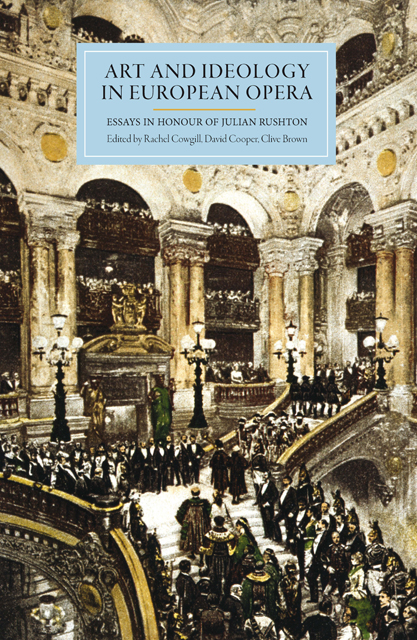Book contents
- Frontmatter
- Contents
- List of Figures
- List of Music Examples
- List of Tables
- Notes on Editors and Contributors
- Acknowledgements
- Introduction
- I Nationalism, Cosmopolitanism and National Opera
- II Opera, Class and the Politics of Enlightenment
- III Opera and Otherness
- Julian Rushton: A Family Memoir
- 7 The Works of Julian Rushton
- Index
- Tabula Gratulatoria
Introduction
Published online by Cambridge University Press: 28 February 2023
- Frontmatter
- Contents
- List of Figures
- List of Music Examples
- List of Tables
- Notes on Editors and Contributors
- Acknowledgements
- Introduction
- I Nationalism, Cosmopolitanism and National Opera
- II Opera, Class and the Politics of Enlightenment
- III Opera and Otherness
- Julian Rushton: A Family Memoir
- 7 The Works of Julian Rushton
- Index
- Tabula Gratulatoria
Summary
This collection of essays has been written in the warmest tribute to Emeritus Professor Julian Rushton by colleagues from the field of musicology, including some of his former doctoral students. Julian holds a commanding position internationally as one of the most influential musicologists of his generation. He is renowned for his encyclopaedic knowledge, for his ability to see straight through to the heart of a problem, and for his scrupulousness and meticulousness as a scholar and editor. At the same time, he is admired and held in the greatest affection and esteem for his humanity and generosity of spirit.
Following his undergraduate studies at Cambridge, Julian undertook doctoral research at the University of Oxford with Jack Westrup, resulting in the thesis ‘Music and Drama at the Academie Royale de Musique, 1774–1789’. Although he has made very significant contributions to many other areas of musicology in the forty years since completing this research, in particular through major studies of Mozart and Berlioz, opera has remained a cornerstone of his interests. Julian taught at the University of East Anglia and then at Cambridge, where he held a fellowship at King's College (1974–81) before being appointed to the West Riding Chair of Music at the University of Leeds. Opera was often the focus of his teaching, and indeed the theme for this volume takes its cue from one of his most popular modules at Leeds, ‘Opera and Politics’.
In his approach to opera Julian has always been alert to questions of power and representation. He observes, for example, how Mozart's treatment of Elettra in Idomeneo forms ‘a psychological and ideological sub-plot in which opera seria is nascent music drama’, reminding us too of the continuities between eighteenth- and nineteenth-century culture that many prefer to regard as separate worlds. The historian Tim Blanning emphasizes opera's place in the repertoire of cultural achievements through which Baroque princes competed for power and status – ‘Opera seria was the representational genre par excellence, for it was grand, formal, classical, elitist, hierarchical, and ideally suited to the propagation of an absolutist politicalmessage’ – yet for nations emerging from oppressive regimes in the course of the nineteenth century, opera was equally important for the formation and expression of new communities, hierarchies and democracies.
- Type
- Chapter
- Information
- Art and Ideology in European OperaEssays in Honour of Julian Rushton, pp. 1 - 10Publisher: Boydell & BrewerPrint publication year: 2010

